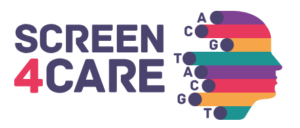 Ralitsa Raycheva, Kostadin Kostadinov, Elena Mitova, Nataliya Bogoeva, Georgi Iskrov, Georgi Stefanov, and Rumen Stefanov, affiliated with Institute for Rare Disease and Department of Social Medicine and Public Health at the Medical University of Plovdiv, аre actively contributing to the Screen4Care project, which started in 2021. This project is dedicated to addressing the challenge of expediting the diagnosis of rare diseases, with particular focus on genetic newborn screening and digital technologies.
Ralitsa Raycheva, Kostadin Kostadinov, Elena Mitova, Nataliya Bogoeva, Georgi Iskrov, Georgi Stefanov, and Rumen Stefanov, affiliated with Institute for Rare Disease and Department of Social Medicine and Public Health at the Medical University of Plovdiv, аre actively contributing to the Screen4Care project, which started in 2021. This project is dedicated to addressing the challenge of expediting the diagnosis of rare diseases, with particular focus on genetic newborn screening and digital technologies.
The primary objective of Screen4Care is to alleviate the burden borne by individuals facing rare diseases. It achieves this through implementation of genetic screening for newborns and the development of innovative digital solutions, including predictive algorithms and the creation of a Virtual Clinic. The overarching aim is to empower patients, foster connections within rare disease communities, and enhance healthcare diagnostics.
As a significant outcome of their involvement in the project, the team have produced a comprehensive scoping review published in “Frontiers in Public Health”, section Public Health Policy. This scoping review dives into the complexities surrounding the mapping of European rare disease databases, particularly as they pertain to machine learning-based screening technologies.
Challenges in mapping European rare disease databases, relevant for ML-based screening technologies in terms of organizational, FAIR and legal principles: scoping review
Given the increased availability of data sources such as hospital information systems, electronic health records, and health-related registries, a novel approach is required to develop artificial intelligence-based decision support that can assist clinicians in their diagnostic decision-making and shorten rare disease patients’ diagnostic odyssey. The aim is to identify key challenges in the process of mapping European rare disease databases, relevant to ML-based screening technologies in terms of organizational, FAIR and legal principles.
The primary article search is conducted in three electronic databases (MEDLINE/Pubmed, Scopus, and Web of Science) and a secondary search is performed in Google scholar and on the organizations’ websites.
At the end of the screening process, 73 studies were eligible for review based on inclusion and exclusion criteria with more than 60% of the research published in the last 5 years and originated only from EU/EEA countries.
Despite the opportunities provided by innovation – automation, electronic health records, hospital-based information systems, biobanks, rare disease registries and European Reference Networks – the results of the current scoping review demonstrate a diversity of the challenges that must still be addressed, with immediate actions on ensuring better governance of rare disease registries, implementing FAIR principles, and enhancing the EU legal framework.
The Screen4Care EU-IMI project has received funding from the Innovative Medicines Initiative 2 Joint Undertaking (JU) under grant agreement No 101034427. The JU receives support from the European Union’s Horizon 2020 research and innovation programme and EFPIA.

